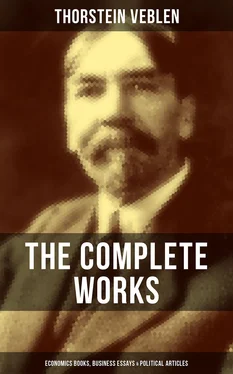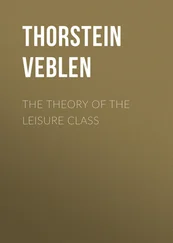Conspicuous Leisure
Table of Contents
If its working were not disturbed by other economic forces or other features of the emulative process, the immediate effect of such a pecuniary struggle as has just been described in outline would be to make men industrious and frugal. This result actually follows, in some measure, so far as regards the lower classes, whose ordinary means of acquiring goods is productive labour. This is more especially true of the labouring classes in a sedentary community which is at an agricultural stage of industry, in which there is a considerable subdivision of industry, and whose laws and customs secure to these classes a more or less definite share of the product of their industry. These lower classes can in any case not avoid labour, and the imputation of labour is therefore not greatly derogatory to them, at least not within their class. Rather, since labour is their recognised and accepted mode of life, they take some emulative pride in a reputation for efficiency in their work, this being often the only line of emulation that is open to them. For those for whom acquisition and emulation is possible only within the field of productive efficiency and thrift, the struggle for pecuniary reputability will in some measure work out in an increase of diligence and parsimony. But certain secondary features of the emulative process, yet to be spoken of, come in to very materially circumscribe and modify emulation in these directions among the pecuniary inferior classes as well as among the superior class.
But it is otherwise with the superior pecuniary class, with which we are here immediately concerned. For this class also the incentive to diligence and thrift is not absent; but its action is so greatly qualified by the secondary demands of pecuniary emulation, that any inclination in this direction is practically overborne and any incentive to diligence tends to be of no effect. The most imperative of these secondary demands of emulation, as well as the one of widest scope, is the requirement of abstention from productive work. This is true in an especial degree for the barbarian stage of culture. During the predatory culture labour comes to be associated in men's habits of thought with weakness and subjection to a master. It is therefore a mark of inferiority, and therefore comes to be accounted unworthy of man in his best estate. By virtue of this tradition labour is felt to be debasing, and this tradition has never died out. On the contrary, with the advance of social differentiation it has acquired the axiomatic force due to ancient and unquestioned prescription.
In order to gain and to hold the esteem of men it is not sufficient merely to possess wealth or power. The wealth or power must be put in evidence, for esteem is awarded only on evidence. And not only does the evidence of wealth serve to impress one's importance on others and to keep their sense of his importance alive and alert, but it is of scarcely less use in building up and preserving one's self-complacency. In all but the lowest stages of culture the normally constituted man is comforted and upheld in his self-respect by "decent surroundings" and by exemption from "menial offices". Enforced departure from his habitual standard of decency, either in the paraphernalia of life or in the kind and amount of his everyday activity, is felt to be a slight upon his human dignity, even apart from all conscious consideration of the approval or disapproval of his fellows.
The archaic theoretical distinction between the base and the honourable in the manner of a man's life retains very much of its ancient force even today. So much so that there are few of the better class who are not possessed of an instinctive repugnance for the vulgar forms of labour. We have a realising sense of ceremonial uncleanness attaching in an especial degree to the occupations which are associated in our habits of thought with menial service. It is felt by all persons of refined taste that a spiritual contamination is inseparable from certain offices that are conventionally required of servants. Vulgar surroundings, mean (that is to say, inexpensive) habitations, and vulgarly productive occupations are unhesitatingly condemned and avoided. They are incompatible with life on a satisfactory spiritual plane __ with "high thinking". From the days of the Greek philosophers to the present, a degree of leisure and of exemption from contact with such industrial processes as serve the immediate everyday purposes of human life has ever been recognised by thoughtful men as a prerequisite to a worthy or beautiful, or even a blameless, human life. In itself and in its consequences the life of leisure is beautiful and ennobling in all civilised men's eyes.
This direct, subjective value of leisure and of other evidences of wealth is no doubt in great part secondary and derivative. It is in part a reflex of the utility of leisure as a means of gaining the respect of others, and in part it is the result of a mental substitution. The performance of labour has been accepted as a conventional evidence of inferior force; therefore it comes itself, by a mental short-cut, to be regarded as intrinsically base.
During the predatory stage proper, and especially during the earlier stages of the quasi-peaceable development of industry that follows the predatory stage, a life of leisure is the readiest and most conclusive evidence of pecuniary strength, and therefore of superior force; provided always that the gentleman of leisure can live in manifest ease and comfort. At this stage wealth consists chiefly of slaves, and the benefits accruing from the possession of riches and power take the form chiefly of personal service and the immediate products of personal service. Conspicuous abstention from labour therefore becomes the conventional mark of superior pecuniary achievement and the conventional index of reputability; and conversely, since application to productive labour is a mark of poverty and subjection, it becomes inconsistent with a reputable standing in the community. Habits of industry and thrift, therefore, are not uniformly furthered by a prevailing pecuniary emulation. On the contrary, this kind of emulation indirectly discountenances participation in productive labour. Labour would unavoidably become dishonourable, as being an evidence indecorous under the ancient tradition handed down from an earlier cultural stage. The ancient tradition of the predatory culture is that productive effort is to be shunned as being unworthy of able-bodied men, and this tradition is reinforced rather than set aside in the passage from the predatory to the quasi-peaceable manner of life.
Even if the institution of a leisure class had not come in with the first emergence of individual ownership, by force of the dishonour attaching to productive employment, it would in any case have come in as one of the early consequences of ownership. And it is to be remarked that while the leisure class existed in theory from the beginning of predatory culture, the institution takes on a new and fuller meaning with the transition from the predatory to the next succeeding pecuniary stage of culture. It is from this time forth a "leisure class" in fact as well as in theory. From this point dates the institution of the leisure class in its consummate form.
During the predatory stage proper the distinction between the leisure and the labouring class is in some degree a ceremonial distinction only. The able bodied men jealously stand aloof from whatever is in their apprehension, menial drudgery; but their activity in fact contributes appreciably to the sustenance of the group. The subsequent stage of quasi-peaceable industry is usually characterised by an established chattel slavery, herds of cattle, and a servile class of herdsmen and shepherds; industry has advanced so far that the community is no longer dependent for its livelihood on the chase or on any other form of activity that can fairly be classed as exploit. From this point on, the characteristic feature of leisure class life is a conspicuous exemption from all useful employment.
Читать дальше












